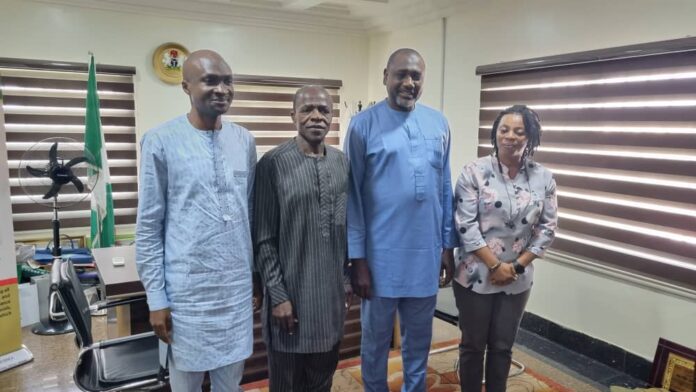The United Nations Environment Programme (UNEP) and its implementing partner, the Energy Commission of Nigeria (ECN), have joined forces under the ‘Scaling Up Energy Efficient and Climate Friendly Cooling in Nigeria’s NDC Revision’ project to collaborate with the National Environmental Standards and Regulations Enforcement Agency (NESREA) in the implementation of the initiative in Nigeria.
In a recent visit to NESREA’s headquarters in Abuja, the project director, Engr. Okon Ekpenyong pointed out that air conditioners (ACs) are the primary electricity consumers in Nigeria hence the need to conserve energy in the air conditioning sector.
Due to Nigeria’s large population and challenging climatic conditions, air conditioners are extensively utilised in both residential and public buildings to create a more comfortable indoor temperature.
“Electricity-wise, air conditioners rank number 1, and since they top the list in energy consumption, they also lead in energy emissions. If our power plants rely on fossil fuels, increased consumption leads to heightened generation and emissions. This is why the focus is now shifting towards energy-efficient air conditioners. However, ACs present two challenges. Firstly, the energy they consume, and secondly, the refrigerant used for cooling. The compressor consumes energy and the refrigerant transforms hot air into cool air. Yet, the choice of refrigerant poses another challenge, as improper selection depletes the ozone layer,” he stated.
He said it was in the light of these challenges that the project was initiated, pointing out that it should not merely be a fragmentary endeavour but should be deeply integrated into national priorities, as highlighted by the Nationally Determined Contributions (NDC).
Ekpenyong, who also serves as the director of linkages, research, and consultancy at the Energy Commission of Nigeria, said the aim of the visit was to secure NESREA’s collaboration and support, as NESREA is a pivotal stakeholder in executing the project within Nigeria.
“In partnering with NESREA, we recognise the agency’s pivotal role concerning the importation of both used and new ACs. Additionally, NESREA plays a key role in regulating the refrigerants used in these ACs. Thus, the basis of our visit today is to engage in direct discussions and fully comprehend the project’s scope,” the project director added.
Speaking in similar vein, the national project coordinator, Etiosa Uyigue, said that NESREA’s involvement would extend to monitoring, verification and enforcement (MVE) along with training for MVE personnel.
He said: “NESREA’s involvement encompasses training relevant agencies in MVE procedures related to energy and environmental standards. This is a crucial component that ensures the successful implementation of the project.”
In response, NESREA’s director-general, Prof. Aliyu Jauro, pointed out the necessity of energy efficiency as a means of conserving resources, particularly in the face of Nigeria’s current challenging economic conditions.
He expressed confidence in NESREA’s willingness and preparedness to collaborate with the project team, ensuring effective implementation of the project, noting that NESREA possesses qualified personnel capable of enforcing the project’s objectives. “As an agency, we oversee 34 environmental regulations spanning various aspects of the environment, including the energy sector. Our emphasis on energy efficiency is evident through the issuance of permits to numerous industries. We are actively engaged in permitting the importation of electrical and electronic equipment, including cooling systems. With our comprehensive regulations, we are poised to play a pivotal role in the project’s execution. We commit to ensuring that only appropriate appliances enter the country and we eagerly partner with you to advance energy-efficient cooling in Nigeria,” Jauro added.


